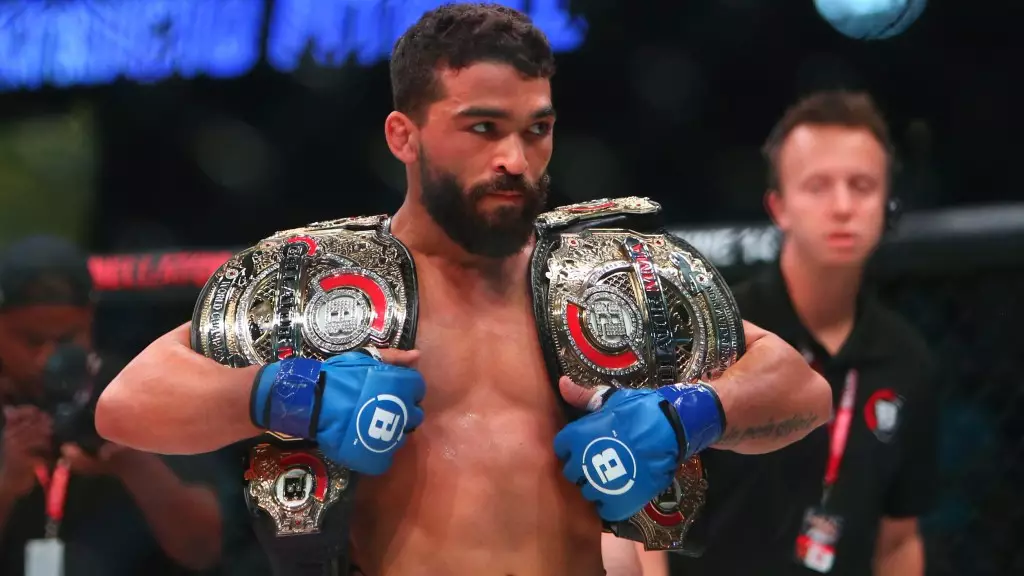The world of mixed martial arts (MMA) is no stranger to athletes making remarkable transitions between organizations, but few stories resonate as powerfully as that of Patricio “Pitbull” Freire. After an illustrious career in Bellator that solidified his legacy as one of the greatest fighters outside the UFC, Freire’s recent signing with the UFC marks a significant chapter in his professional journey. This move, however, was not without its challenges, revealing the complexities of navigating an evolving sport and the bureaucracy behind it.
When Freire departed from the Professional Fighters League (PFL), many anticipated a swift transition to the UFC. In an interview, Freire shared his initial optimism, believing that his release would lead to immediate interest from UFC officials. Yet, the reality proved to be quite different. Freire faced unexpected hurdles, including concerns from within the UFC about his age. Interestingly, it was noted that Freire shares the same birthday as current champion Alex Pereira, perhaps providing a notable counter-argument to the age bias that some expressed. His journey illustrates how external perceptions can influence an athlete’s opportunities within such a competitive landscape.
The internal discussions among UFC brass showcased the divide in opinion regarding Freire. His eventual acceptance of various fight proposals that younger fighters declined likely contributed to shifting perspectives in his favor. Freire’s willingness to step up where others hesitated illustrated not only his determination but also his competitive spirit, qualities that are essential for any fighter aiming to succeed in the high-stakes environment of the UFC.
Freire’s outspoken criticism of reluctant fighters highlights a sentiment shared by many in the MMA community: the essential nature of competition. In a sport characterized by its physicality, he directly called out younger opponents, dubbing those who refuse to fight him as “p*ssies.” This audacious stance resonates with fans who appreciate fighters willing to take risks. Freire’s message underscores the expectation that professional fighters should be willing to accept challenges, regardless of their backgrounds or rankings, reinforcing the idea that true champions must remain active and engaged.
He also acknowledged the notion that his age could be a limiting factor. While some observers may view 37 as a milestone that may impede performance, Freire has taken a scientific approach to counter these concerns. By citing personal training data, he emphasizes his ongoing ability to improve, presenting a compelling argument against the common narrative of age-related decline.
Freire’s candid acknowledgment of his neck surgery adds another layer of depth to his story. Rehabilitation not only paved the way for a return to peak performance but also served to elevate his physical capabilities beyond previous levels. He expressed confidence in his renewed strength and conditioning, claiming improved metrics in power, strength, and endurance. This post-surgery revitalization offers intriguing insights into how athletes can utilize advanced medical interventions to enhance their longevity in the sport, a growing trend among seasoned fighters who face unique challenges as their careers progress.
Moreover, his comments on enhancing technical skills at this late stage in his career reflect the evolution of a fighter’s strategy. Freire’s ability to optimize energy expenditure and his improved technique signal a mature evolution that often accompanies years of experience. Such insights reveal a mindset that prioritizes intelligence in combat over sheer physical prowess—a crucial aspect as he competes against younger talent.
Now firmly planted in the UFC, Freire has turned his focus toward immediate goals rather than dwelling on legacy. His commitment to capturing UFC gold resonates as a clear priority. The drive to challenge for the title underscores his ambition and determination as he steps into the octagon against rising stars. Rather than becoming mired in reflections of past accomplishments, Freire embodies a forward-focused athletic spirit, intent on making his mark in a new arena.
The amalgamation of experience, technical skill, and raw determination solidifies Patricio Freire’s presence in the UFC and sets the stage for what could be a fascinating career resurgence. As he gears up for his upcoming fight against Yair Rodriguez, all eyes in the MMA world are poised to witness whether Freire can transform the realm of possibilities he has embraced into tangible success, thus embarking on a new legacy within the premier organization of the sport. With his sights firmly set on the title, the anticipation surrounding Freire’s next steps could very well start a new dialogue about age, competitiveness, and the relentless pursuit of greatness in MMA.

